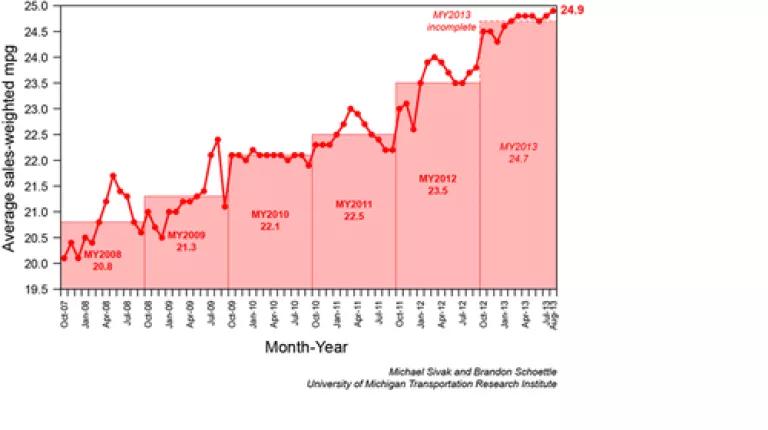
With sales of electric and other fuel-efficient cars hitting new highs in the U.S., the timing for DOE to restart its auto retooling program couldn’t be better. Electric vehicle sales in the U.S. hit a new high of 11,361 units, and average fuel efficiency for new passenger vehicles hit a new record high of 24.9 mpg. By jump starting the auto retooling loan program, DOE can put the U.S. auto industry in the best possible position to compete for the growing market for clean cars.
Electric Car Sales and Average Fuel-efficiency Hit Record Highs
August was a record-breaking month for the electric car market, setting a sales record in August of 11,363 units, a 50% increase from the previous month. The Volt, Nissan LEAF, the Ford Fusion Energi, Toyota Prius PHEV and RAV4 EV all set new records. Year-to-date sales of plug-ins of 59,537 have now well passed 2012, when 52,581 EVs were sold.
According to the University of Michigan, the average fuel efficiency of new passenger vehicles sold in the U.S. hit its highest level ever, 24.9 mpg, up 0.1 mpg from July and 1.2 mpg from August 2012. Importantly, U.S. auto sales also were the highest since May of 2007, with some experts citing more fuel-efficient car and pickup models helping to boost sales by making new vehicles more appealing.

Getting DOE’s Auto Retooling Loans Back on Track
Strong consumer demand for clean cars bodes well for Secretary Moniz’s vow to revive the DOE’s advanced auto loan retooling program, knows as the Advanced Technology Vehicle Manufacturing (ATVM) program. Despite its critics, by most objective measures, the program has been a clear success.
Of the five loans that DOE has granted, only two have failed, but the total losses to government amount to less than 3 percent of the $8.4 billion in loans approved. The loan to Tesla has been a stunning success, with Tesla repaying its $465 million loan five years in advance and has a market capitalization of $20 billion. In Smyrna, Tennessee, Nissan is producing battery packs for its U.S.-made all electric LEAF cars in a factory made possible by a $1.4 billion DOE loan. And Ford was able to modernize thirteen factories to build more fuel-efficient versions of its most popular models, including the Focus, Fusion, Escape and F-150, thanks to a $5.9 billion DOE loan.
DOE should move as fast as possible to ensure the U.S. auto industry is in the best possible position to take advantage of the strong consumer demand for clean, advanced cars. The auto loan program already has helped create or save thousands of jobs, reduced oil dependency and air pollution, and has been a key factor in keeping the U.S. auto industry on the cutting edge of manufacturing clean car technologies.
Vocal critics of the program conveniently turn a blind eye to the clearly wasteful annual $8 billion in direct taxpayers subsidies to the oil industry. If the auto retooling loan program has one major failing, it’s that it has not been sufficient to overcome the partisanship in Congress around clean energy.
